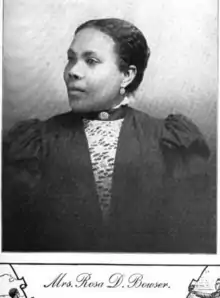Rosa Dixon Bowser
Rosa L. Dixon Bowser (January 7, 1855 – February 7, 1931) was an American educator. She was the first black teacher hired in Richmond, Virginia. She organized the Virginia Teachers' Reading Circle, which became the Virginia State Teachers Association, the first organization representing black teachers in Virginia, serving as the organization's president from 1890 to 1892. Bowser was president of the Woman's Christian Temperance Union in Virginia, as well as founder and first president of the Richmond Woman's League. She was a correspondent for the magazine The Woman's Era, and wrote essays for national publications. The first branch of the Richmond Public Library to serve African-American patrons was named for Bowser.
Rosa Dixon Bowser | |
|---|---|
_(14784366372).jpg.webp) Rosa L. Dixon Bowser, from an 1893 publication | |
| Born | Rosa L. Dixon January 7, 1855 |
| Died | February 7, 1931 (aged 76) Richmond, Virginia, United States |
| Nationality | American |
| Occupation | Educator |
| Known for | First black teacher hired in Richmond, Virginia |
Early life
Rosa L. Dixon was born in Amelia County, Virginia, the daughter of Henry Dixon and Augusta Anderson Hawkins Dixon; she was "most likely born enslaved".[1] As a child she moved to post-war Richmond with her parents, and was educated by teachers from the Freedmen's Bureau. She was identified as a promising student and trained as a teacher at the Richmond Colored Normal School.[2]
Career

Dixon was just seventeen years old when she became the first black teacher hired by the Richmond, Virginia, public schools.[3] She taught in schools from 1872 until 1879, and again in widowhood from 1883 until she retired in 1923. She also taught night classes for young African-American men through YMCA. She organized the Virginia Teachers' Reading Circle, which became the Virginia State Teachers Association,[4] the first organization representing black teachers in Virginia.[5] She served as the organization's president from 1890 to 1892.[6][7]
In 1902 Bowser was president of the Women's Christian Temperance Union in Virginia.[8][9] She gave lectures at the annual gatherings of the Hampton Negro Conferences, and chaired the Committee on Domestic Science from 1899 to 1902. She raised funds for the Industrial Home School for Colored Girls and the Virginia Manual Labor School for Colored Boys. She was founder and first president of the Richmond Woman's League. She supported the Virginia Colored Anti-Tuberculosis League in Richmond, and helped to found the National Association of Colored Women's Clubs and the Virginia State Federation of Colored Women's Clubs.[1]
She was Virginia correspondent for the magazine Woman's Era.[10] Bowser wrote essays for national publications, including "What Role is the Educated Negro Woman to Play in the Uplifting of her Race?" (1902),[11] and "The Mother's Duty to her Adolescent Sons and Daughters" (1902).[12]
In 1925, the first branch of the Richmond Public Library to serve African-American patrons was named for Bowser.[13]
Personal life
Rosa Dixon married fellow teacher James Herndon Bowser (who was a relative of Civil War spy Mary Bowser)[14] in 1879. Two years later, she was widowed when James died from tuberculosis. They had a son, Oswald Barrington Herndon Bowser (1880-1935), who became a medical doctor in Richmond.
Rosa Dixon Bowser died in 1931, aged 76 years.[15] (Her grave was mentioned in a 2017 New York Times essay about restoration efforts at "neglected black cemeteries".)[16] The Rosa D. Bowser School in Richmond (the home of the Black History Museum and Cultural Center of Virginia from 1991 to 2015)[17] was named for her.[18]
References
- Veronica Alease Davis and The Dictionary of Virginia Biography, "Rosa L. Dixon Bowser" Encyclopedia Virginia (Virginia Foundation for the Humanities 2013).
- Monroe Alphus Majors, ed. Noted Negro Women: Their Triumphs and Activities (Donohue & Henneberry 1893): 149-151.
- Suzanne Lebsock, A Murder in Virginia: Southern Justice on Trial (W. W. Norton and Company 2004): 147- 148. ISBN 9780393326062
- "Mrs. R. D. Bowser" Richmond Planet (January 12, 1895): 1. via Newspapers.com

- L. P. Jackson, A History of the Virginia State Teachers Association (The Guide Publishing Company 1937).
- Ruth Edmonds Hill, "Rosa Dixon Bowser" in Jessie Carney Smith, Notable Black American Women Book 2 (VNR AG 1996): 51-53. ISBN 9780810391772
- Hilary Green, Educational Reconstruction: African American Schools in the Urban South, 1865-1890 (Oxford University Press 2016): 84-85. ISBN 9780823270118
- "Work of our Women" The Colored American (May 17, 1902): 9. via Newspapers.com

- "Mrs. Lawson in Richmond" The Colored American (May 10, 1902): 6. via Newspapers.com

- Rosa D. Bowser, "Virginia" Women's Era 2(1)(1895).
- Daniel Wallace Culp, ed., Twentieth Century Negro Literature (J. L. Nichols 1902): 176-182.
- Irving Garland Penn and John Wesley Edward Bowen, eds., The United Negro: His Problems and His Progress (D. E. Luther Publishing Company 1902): 446-448.
- Elvatrice Parker Belsches, Richmond, Virginia (Arcadia Publishing 2002): 60. ISBN 9780738514031
- Ronald E. Franklin, "Mary Elizabeth Bowser: Union Spy in the Confederate White House" Owlcation (August 9, 2016).
- P. Kevin Morley, "Volunteers Help Restore 'Four Cemeteries at Evergreen'" Richmond Times-Dispatch (February 16, 2014).
- Brian Palmer, "For the Forgotten African-American Dead" New York Times (January 8, 2017): SR2.
- "Black History Museum Taps New Director" Richmond Free Press (October 9, 2015).
- Bowser School, Richmond Public Schools, A Mini History: Bits and Pieces.
External links
- Rosa L. Dixon Bowser's gravesite at Find a Grave